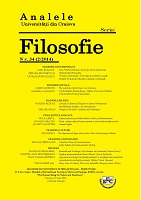« QU’EST-CE QUE LA LITTÉRATURE ? » OU LA PENSÉE SARTRIENNE DE LA LITTÉRATURE ENGAGÉE
« WHAT IS LITERATURE? » SARTRE’S CONCEPTION OF COMMITED LITERATURE
Author(s): Mihály BácskaiSubject(s): Ethics / Practical Philosophy, Political Philosophy, Social Philosophy, French Literature
Published by: Editura Universitaria Craiova
Keywords: Sartre; literature; liberty; responsability; democracy; values; morality;
Summary/Abstract: The «What is literature? » (Situations, II, Gallimard, 1948), is a famous essay by Sartre about the commitment of literature. The author answers three questions: What does it mean to write?, Why do we write?, and who do we write for ? In his answer to the first question, Sartre explains that the writer needs to commit himself in his works. Writing is the question of will and choice at the same time. In answer to the second question, Sartre stresses the importance of liberty. He believes that the art of writing is connected to liberty, in consequence to democracy. The author’s answer to the third question is that we write for the universal reader who is characterised by his liberty. He commits himself just like the writer. In his conclusion, Sartre emphasises that contemporary literature must be problematic and moral. Literature must indicate that the man is value and the questions he asks are always moral.
Journal: ANALELE UNIVERSITĂȚII DIN CRAIOVA. SERIA FILOSOFIE
- Issue Year: 1/2014
- Issue No: 33
- Page Range: 35-41
- Page Count: 7
- Language: French

